More than just an emergency relief program
7 Nov 2022
LMU institutions are running various initiatives to support researchers from Ukraine. The result? Interdisciplinary networks from which both sides benefit.
7 Nov 2022
LMU institutions are running various initiatives to support researchers from Ukraine. The result? Interdisciplinary networks from which both sides benefit.
Kärin Nickelsen recalls her own feelings of horror and helplessness when Russia’s war against Ukraine broke out. And, like so many of her colleagues, the Professor of the History of Science began to provide help within days. “To start with, the Historical Seminar was inundated with a huge wave of applications for the scholarship program for Ukrainian academics that we launched on the initiative of Dr. Iryna Klymenko,” Nickelsen explains. “We knew we could not take everyone, although we were able to pass some applicants on to other academic institutions.”
“The support network for Ukrainian refugee academics set up at the Historical Seminar with the aid of partners such as the Deutsch-Ukrainische Historikerkommission, DUHK (German-Ukrainian Historians’ Commission) occupies a stand-out position within Germany’s higher education landscape,” notes Martin Schulze Wessel, Professor of Eastern European History at LMU and founding chairman of the DUHK. “We were able to find work for a total of 14 academics in Munich, while around 40 were placed elsewhere. Alongside donations – mostly from members of the Historical Seminar – we were also able to secure funding by applying to the Volkswagen and Gerda Henkel Foundations.”
LMU creates an environment that, in many respects, is ideal for academic work.Prof. Dr. Natalia Kovalchuk, Gerda Henkel Foundation Research Fellow
The program is supported by lots of institutions and private individuals in Munich. Some accommodation was made available by the Freundeskreis der Jüdischen Geschichte und Kultur (Friends of Jewish History and Culture), with contacts passed on by Yiddish lector Dr. Evita Wiecki, who recently passed away. LMU’s International Office also helped by funding additional scholarships, for example, and the Center for Advanced Studies provided assistance to guest refugees.
Besides the Faculty of History, institutions from other research areas too joined forces to help out: Via the Life Science Network, Munich’s research consortiums engaged in dialogue surrounding their focal disciplines. Collaborative Research Centers and Transregio sites offered individual support to researchers in need, from the provision of contacts to internships, German language courses and even the funding of scholarships for pre-doctoral, doctoral and postdoctoral researchers.
Several faculties – such as the Faculty of Business Administration and the Faculty of Law – have also taken in scholarship holders from Ukraine. In addition, a number of projects funded by the European Research Council (ERC) are likewise providing opportunities for support and employment at LMU.
Feedback on these initiatives has been positive across the board, not only from the Ukrainian guests. "Despite the tragic situation, there are also positive aspects arising from encounters and dialogue,” says Dr. Elizabeth Schroeder-Reiter, for example. She coordinates the graduate programs for Collaborative Research Centers 1054 and 1064. Together with Dr. Susanne Hennig, Managing Director of the Center for NanoScience, she has been helping to forge networks in the life sciences. The Historical Seminar stresses that it did not merely want to set up an emergency relief program: “These are visiting academics, and we are enabling them to continue their work,” Kärin Nickelsen says. New research networks are springing up as a result. Natalia Kovalchuk, a history professor from Lviv, has this to say: “LMU creates an environment that, in many respects, is ideal for academic work. Moreover, the Bavarian State Library possesses an impeccable collection of literature on Eastern Europe. And there are colleagues here who are working on similar topics.”
The Ukrainian Research Seminar organized by the Historical Seminar is a case in point: In the summer semester, this institution gave the guest researchers a chance to engage in discussion and present their work to the public. Over the past few months, more attention has been paid to actively involving the scholarship holders in the topics addressed at LMU and putting them in touch with scientific institutions throughout Germany. Doing precisely this is all the more urgent given that, as the military conflict drags on, guests are forced to stay for longer than was anticipated. Before the war broke out in Ukraine, Kyiv-based Professor Tamara Hundorova says she could never have imagined being a refugee. Like many Ukrainian academics, she had no idea how long it would be before she could see her home again. “None of us thought it would go on for so long,” Kovalchuk says.
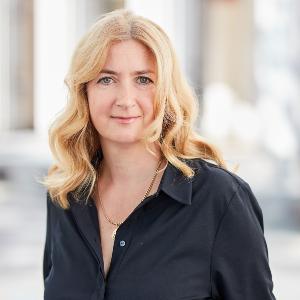
Dr. Alina Gorlova | © Stephan Höck / LMU
Alina Gorlova
“The plans of all Ukrainians were ruined by this war and now we need to adapt to a new reality far away from home,” says Alina Gorlova.
The chemist now works in Professor Dieter Braun's laboratory at the ‘Emergence of Life’ Collaborative Research Center, alongside colleagues from the fields of astrophysics, geosciences, chemistry and biochemistry: "The interdisciplinary nature of my working group is particularly exciting. I can learn a lot here.”
Before the war, Alina Gorlova was a researcher at the Institute of Organic Chemistry at Ukraine’s National Academy of Sciences and Project Manager at Enamine LTD.
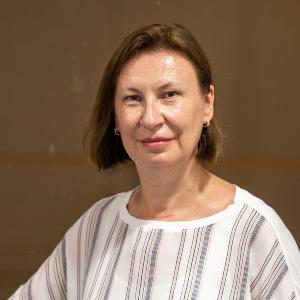
Prof. Dr. Natalia Kovalchuk | © LMU
Natalia Kovalchuk
“I am grateful for the tremendous support provided in Germany. This is an unusual situation for the humanities, especially for researchers dealing with Eastern European topics,” says Natalia Kovalchuk.
One of the historian’s primary research topics is the Pan-Slavic movement of 19th and early 20th century. At the LMU History Department she is currently working on "the idea of the missionary role of Russia" in the context of Pan-Slavism.
Professor Natalia Kovalchuk is Associate Professor of History at the Ukrainian Catholic University in Lviv and currently leads its interdisciplinary Liberal Arts baccalaureate program.
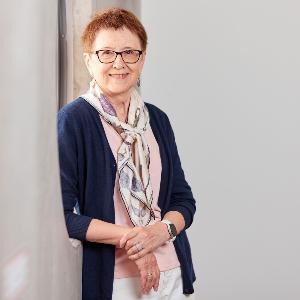
Prof. Dr. Tamara Hundorova | © Stephan Höck / LMU
Tamara Hundorova
Literature Professor Tamara Hundorova came to Munich with her husband and grandson in March. Until September, she engaged in research at the Historical Seminar and at LMU’s Institute of Slavic Philology: “My time in Munich was very intense and productive. I gave many lectures and worked on a project about the idea of Europe and how it was perceived by displaced Ukrainian intellectuals after World War II.”
In her research, Tamara Hundorova is particularly interested in the 1940s. “And now I find myself in a similar situation to the people I am researching,” she notes.
Professor Tamara Hundorova is Head of the Department of Literary Theory and Comparative Literature at Ukraine’s National Academy of Sciences and an Associate Research Fellow at the Harvard Ukrainian Research Institute.
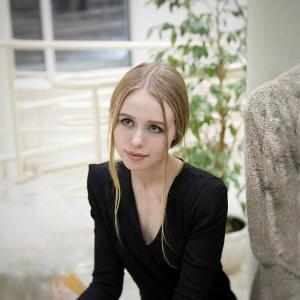
Anna Umanska | © Serhii Udovyk
Anna Umanska
Anna Umanska was traveling in Hungary when the war began in Ukraine. The doctoral candidate did not use her return ticket to Kyiv on 25 February. Instead, she started looking for ways to continue writing her doctoral thesis on the Kyiv Kultur Lige (Culture League) as a Jewish cultural and educational phenomenon.
After a research stay in Bonn, Umanska came to Munich in May. "I am fortunate to be able to work here with the Bavarian State Archives and the Archive of the Free Ukrainian University, where there are many materials on Jewish journals from the early Soviet era," explains the doctoral student, who received a scholarship from LMU’s History Department.
Anna Umanska is a doctoral researcher at the M. S. Hrushevsky Institute for Ukrainian Archaeography and Sources at the National Academy of Sciences in Ukraine.
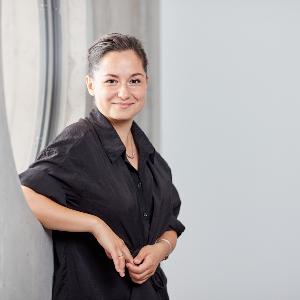
Dr. Kateryna Yeremieieva | © Stephan Höck / LMU
Kateryna Yeremieieva
Another scholar whose work is benefiting from Munich’s libraries and dialogue with her LMU colleagues is humor and satire researcher Kateryna Yeremieieva, who fled from Kharkiv to Munich and received a scholarship at the ‘Cultures of Vigilance’ Collaborative Research Center.
During her time at LMU, she has researched forms of black humor in times of war, then and now: “There are similarities when it comes to black humor. Humor spreads extremely quickly in moments of mortal danger, as it helps people feel superior to their enemy while reducing stress and fear.”
Dr. Kateryna Yeremieieva is Senior Lecturer at the Ukrainian State University of Railway Transport in Kharkiv and a member of the British Teaching Council’s Teaching Excellence Program in Ukraine.
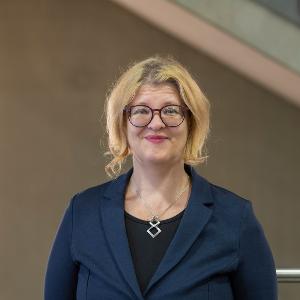
Prof. Dr. Olena Pavlova | © LMU
Olena Pavlova
After the war broke out, ethics professor Olena Pavlova initially fled to Poland. In July, she came to the History Department of LMU Munich, where she researched the perception and memory of the war in Ukraine with the aid of cultural-historical approaches.
“So many people helped me when I moved to Munich,” Pavlova recalls, emphasizing how much she has also benefited from her stay on a professional level: “It is very interesting for me to learn how German universities are organized, because the cultural practice of academic life is one of my research priorities.”
Professor Olena Pavlova is Professor of Ethics, Esthetics and Cultural Studies at the Taras Shevchenko National University of Kyiv.
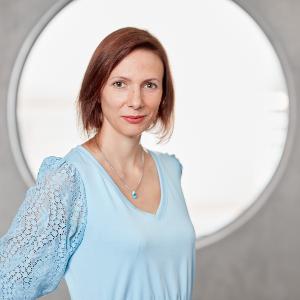
Nataliia Andriushchenko | © Stephan Höck / LMU
Nataliia Andriushchenko
When the war caused Nataliia Andriushchenko to lose her job as a scriptwriter at the local TV station in Dnipro, she was given temporary employment at DOK.fest Munich in April. For the past few months, the journalist, film maker and media researcher has been working on the ERC project ‘T-MIGRANTS’ at LMU’s Institute for Theater Studies.
Within the framework of her scholarship, Andriushchenko is researching the methods and techniques used in creative documentaries. She finds the library infrastructure very helpful: “I am very grateful for the opportunity to use the Munich libraries. I have found a lot of material about creative documentaries from Europe.”
Nataliia Andriushchenko is an author and producer of documentaries and has penned more than 1,000 articles about cinema, film and theater. She has also written the biographies of two prominent Ukrainian academics.